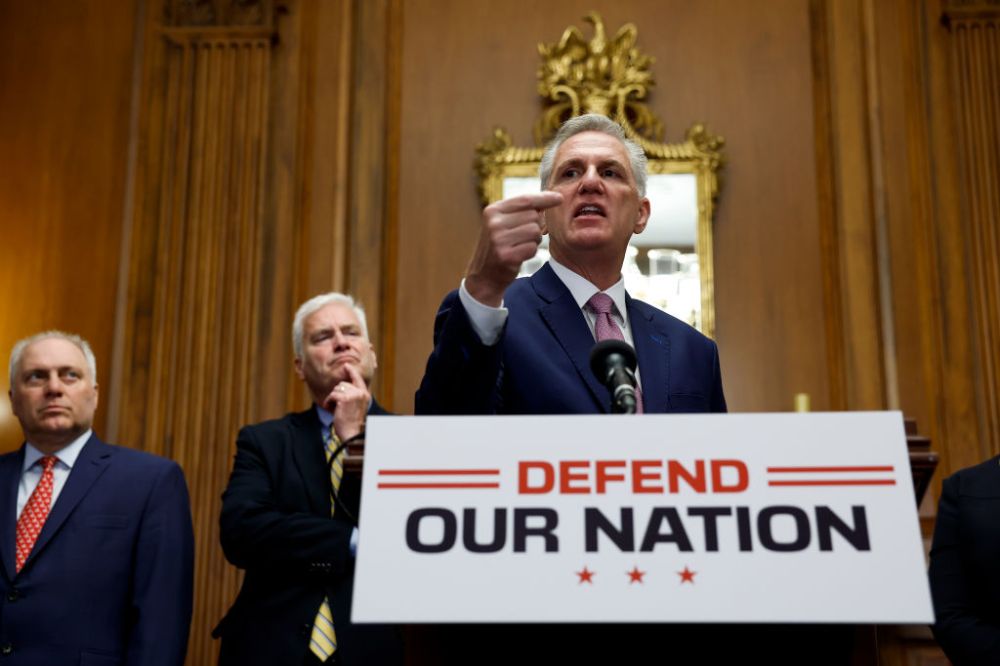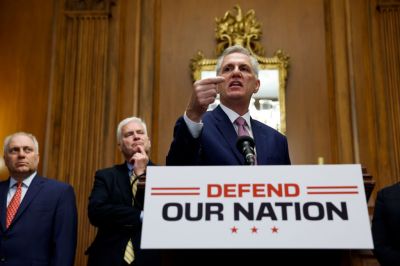The House of Representatives approved its mammoth annual defense policy bill Friday morning along narrow bipartisan lines, 219-210. Four Republicans voted against the $886 billion bill and four Democrats supported it.
Final passage of the National Defense Authorization Act (NDAA), which sets Pentagon policy for the fiscal year and sets pay for U.S. military personnel, came after a marathon series of tough votes on polarizing amendments Thursday that lasted into Friday morning. Conservatives in the party won key victories Thursday, rescinding Pentagon policies of covering abortion travel and transgender medical procedures for service members, as well as eliminating the Pentagon’s diversity, equity, and inclusion programs and their staff.
Other amendments hardline Republicans fought for, such as rolling back aid to Ukraine, failed along bipartisan lines. (You can read more about the 80 amendments the House considered Thursday here.)
Democratic leadership was so confident most of their members wouldn’t support the bill they didn’t bother whipping against the final vote, according to Politico, and those who did defect were from battleground districts.
Yet the bill will almost certainly be dead on arrival in the Senate, which just started working on its version.
“Of course they’re gonna, they’re gonna pass a version that has none of that stuff in it,” House Armed Services Chairman Mike Rogers tells The Dispatch about the Senate’s version of the bill. “Obviously the Democrats control the other chamber and they’re gonna have a different opinion.”
The NDAA is typically supported with comfortable bipartisan margins.
Throughout the process, House Freedom Caucus members found ways to remind GOP leadership of their ability to derail proceedings: On Thursday, a group of Freedom Caucus members delayed voting to approve the rule (a preliminary vote for consideration of a particular bill) until the last moment. Some of the Republicans to vote against the bill were also the chambers’ more hardline members, including Reps. Eli Crane of Arizona, Andy Biggs of Arizona, Ken Buck of Colorado, and Thomas Massie of Kentucky.
One of the most hotly debated amendments was sponsored by Rep. Ronny Jackson, a Texas Republican, to reverse a Pentagon policy to reimburse service members’ travel expenses to obtain an abortion (though the policy did not permit the military to pay for the abortion itself).
Republicans said it basically flouted a longtime law barring taxpayer funds from paying for abortions, referred to as the Hyde Amendment.
In the end, only two Republicans defected to oppose the travel amendment: Rep. Brian Fitzpatrick and Rep. John Duarte. Texas Rep. Henry Cuellar was the sole Democrat to vote in favor.
Conservatives said taking the vote was key even if it doesn’t remain in the final version.
“It’s extremely important to my constituents and supporters,” Rep. Chip Roy, a House Freedom Caucus member, says.
Democrats were already making much of the amendment: In a press conference Friday morning, House Democratic leadership included signs targeting Republicans who supported the vote from battleground New York districts.
The Pentagon’s policy of refunding abortion-related expenses has also become an issue in the upper chamber, where Alabama Sen. Tommy Tuberville has refused to lift a months-long blockade on military promotions until the Defense Department rescinds the policy. So far, he’s held up more than 250 military promotions and nominations.
Not all conservative amendments made it across the finish line. A bipartisan majority of lawmakers rejected an attempt to strip military aid to Ukraine from the NDAA. One amendment, from Georgia Rep. Marjorie Taylor Greene, would have rescinded $300 million of funding for Ukraine. It was rejected 358-89. Rep. Matt Gaetz’s amendment to block all U.S. assistance to Ukraine failed on a 358-70 vote. Though the votes failed, nearly one-third of House Republicans went on the record as opposing Ukraine aid.
Meanwhile, some moderate Republicans who ended up supporting the abortion amendment griped afterward that it may backfire for lawmakers from battleground districts.
“This is going to die in the Senate,” Rep. Nancy Mace, a South Carolina Republican, tells The Dispatch. She added that the vote makes Republicans “look like assholes.”
Yet she ultimately voted for the abortion amendment and the NDAA.
Defunding The Government (Employees)
House Republicans seeking to get rid of members of Joe Biden’s Cabinet may opt for a faster route than impeachment: defunding their salaries.
An obscure rule allows any lawmakers to propose an amendment that would “retrench expenditures” of federal agencies in appropriations bills. That could mean reducing an individual federal employee’s wage, eliminating positions or programs, or cutting an agency’s overall staffing numbers, according to the nonpartisan Congressional Research Service.
Some Republicans want to zero out the salaries of their least favorite Biden Cabinet officials, including Attorney General Merrick Garland and Homeland Security Secretary Alejandro Mayorkas.
Because Democrats control the Senate any such provision that makes it into an appropriations package would be symbolic. But that hasn’t stopped some Republicans from eying the idea.
“You got to force the hand of the administration,” Rep. Chip Roy says. “We ought to use power of the purse where appropriate, whether it's through the Holmon rule or whether it's through, frankly, the straight up funding process through September.”
Rep. Ken Buck, a Colorado Republican and House Freedom Caucus member, told Politico that while he’s not yet sold on impeaching Biden officials, giving Mayorkas as an example, an appropriate response to policy differences would be “to cut his salary in the appropriations process.”
House GOP leadership seems unlikely to oppose the push: The House adopted the Holmon rule in January in its rules package, with Speaker Kevin McCarthy’s blessing.
“I don’t agree with it,” Rep. Henry Cuellar, a moderate Texas Democrat, tells The Dispatch. “Look, there are policy disagreements and you might try to have an impact or trying to have an effect on policy but to go after salaries and all that, to me, it’s too much.”
Rep. Gerald Connolly, a Virginia Democrat, told the Washington Post the rule was “another intimidation tool for civil servants.”
Some moderate Republicans also didn’t sound exactly warm to it.
“I’m always careful about things like that,” Rep. Jeff Van Drew, a New Jersey Republican who defected from the Democratic Party in 2019, tells The Dispatch. He criticized Mayorkas as “literally hurting the United States of America” but added, “you gotta be really careful. Taking his money away—take his position away—you just have to make sure that you’ve thoroughly vetted it.”






Please note that we at The Dispatch hold ourselves, our work, and our commenters to a higher standard than other places on the internet. We welcome comments that foster genuine debate or discussion—including comments critical of us or our work—but responses that include ad hominem attacks on fellow Dispatch members or are intended to stoke fear and anger may be moderated.
With your membership, you only have the ability to comment on The Morning Dispatch articles. Consider upgrading to join the conversation everywhere.